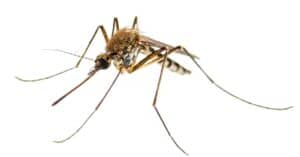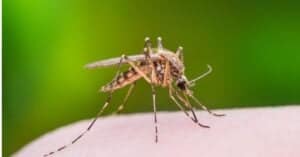Mosquitoes are small, flying insects that belong to the family Culicidae. They are known for their painful bites and ability to spread disease. Mosquitoes bite because they need blood to lay eggs. Female mosquitoes feed on blood, while males primarily feed on nectar and other plant juices.
Mosquitoes are most active during warm weather months, typically from late spring through early fall. However, some species can be active year-round in warmer climates. Mosquito activity is also influenced by factors such as humidity levels and rainfall.
There are over 3,000 species of mosquitoes worldwide, with different physical characteristics depending on the region they inhabit. In general, adult mosquitoes have slender bodies with long legs and wings covered in tiny scales. They range in size from about 3-9mm long.
Mosquitos can definitely bite through clothes. It is important to note that not all mosquito species bite humans. Some prefer animals or birds instead. However, many of the most common species found in North America do bite humans and can transmit diseases such as West Nile virus and Zika virus.
Knowing what attracts mosquitoes (such as body heat and carbon dioxide) can help individuals take steps to avoid getting bitten or reduce their risk of exposure to these diseases through proper clothing choices, the use of repellents, and eliminating standing water where mosquitoes breed.
What to Wear
Mosquitoes possess six lengthy needle-like mouthparts known as proboscis, which can puncture thin material such as gauze or spandex. This enables them to feed on human blood by injecting saliva. Here are fabrics that are the most mosquito-proof.
Denim
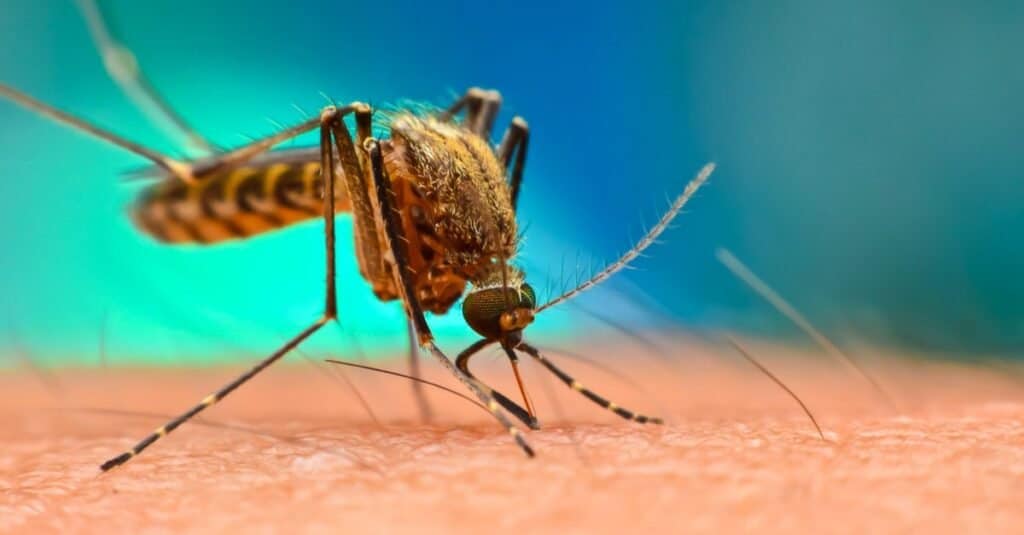
Wearing denim clothing that is loose-fitting can help protect against mosquito bites.
©Digital Images Studio/Shutterstock.com
Denim, a sturdy cotton fabric that is tightly woven and often thick in texture, provides a physical barrier between your skin and mosquitos. The tight weave of denim makes it difficult for mosquitoes to penetrate the fabric with their proboscis (long nose-like mouthpart), which they use to puncture the skin and suck blood. Additionally, the thickness of denim may make it harder for mosquitoes to detect body heat or carbon dioxide emissions – two cues that attract them to humans.
However, it’s important to note that not all denim is created equal when it comes to its ability to protect against mosquito bites. A lighter-weight denim or one with a looser weave may not provide enough protection from these pesky insects. It’s also worth noting that while wearing long sleeves and pants made of denim can help reduce your risk of mosquito bites; you should still take other preventative measures, such as using insect repellent on exposed skin and eliminating standing water where mosquitoes breed.
Tight-Knit Wool
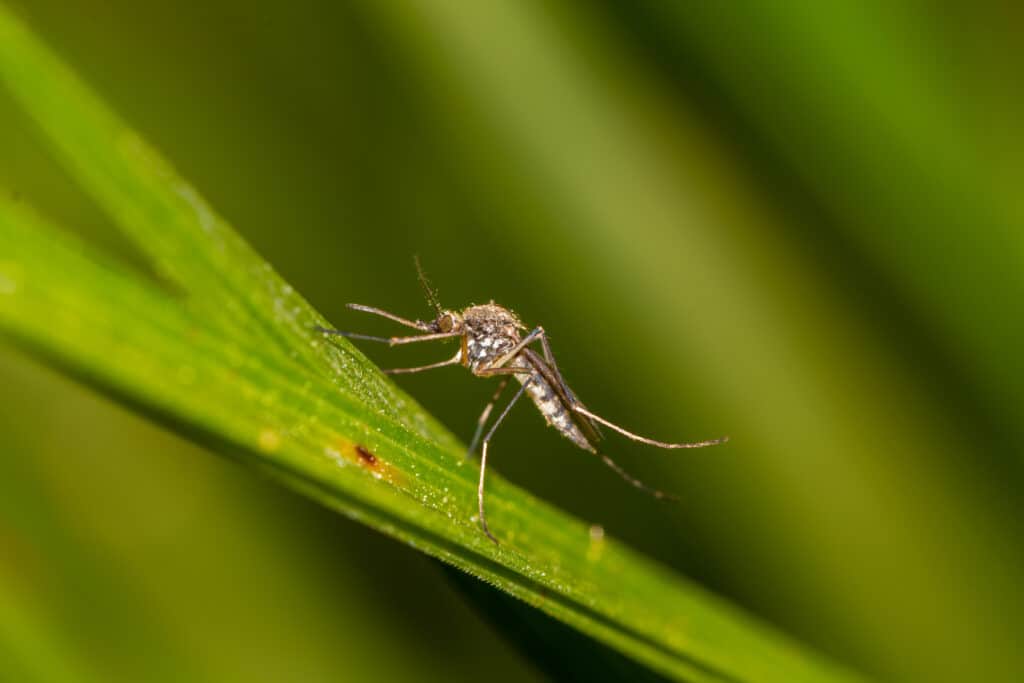
Male mosquitos do not bite. They prefer to eat nectar.
©Roziline/Shutterstock.com
Wearing tight-knit wool clothing can serve as an effective barrier against mosquito bites. Mosquitoes are attracted to the carbon dioxide and heat that our bodies emit, so they often target areas of exposed skin where these signals are strongest. However, by wearing tight-knit wool clothing, you can block access to your skin and reduce the likelihood of being bitten.
The dense weave of wool fibers creates a physical barrier that mosquitoes cannot easily penetrate. Unlike loosely woven fabrics or thin materials like cotton, which provide little resistance against mosquito proboscises (the needle-like mouthparts they use to feed), tightly knit wool garments create a sturdy shield that makes it difficult for these pests to reach their intended targets.
In addition to its protective qualities, wool is also naturally moisture-wicking and breathable, making it a comfortable choice for outdoor activities in hot and humid conditions where mosquitoes may be present.
Nylon Ripstop
Nylon ripstop clothing is a popular choice for outdoor enthusiasts and travelers who want to protect themselves from mosquito bites. This type of fabric is made by weaving nylon threads together in a tight pattern, which creates a durable and tear-resistant material that can withstand the rigors of outdoor activities.
One of the main benefits of wearing nylon ripstop clothing is that it provides an effective barrier against mosquitoes. The tight weave of the fabric makes it difficult for mosquitoes to penetrate the material and reach your skin. This means that you are less likely to get bitten while wearing this type of clothing, especially if you cover as much skin as possible with long sleeves and pants.
Another advantage of nylon ripstop clothing is its lightweight and breathable nature, which makes it comfortable to wear even in hot weather conditions. Unlike heavy fabrics such as denim or canvas, nylon ripstop allows air to circulate freely around your body, keeping you cool and dry while protecting you from biting insects.
Velvet
Velvet clothing can provide a certain level of protection against mosquito bites due to its thickness and texture. The soft, plush fabric is woven with densely packed fibers that make it difficult for mosquitoes to penetrate through to the skin underneath. Additionally, velvet has a fuzzy surface that traps air pockets, creating an insulating layer between the body and any insects attempting to bite through the material.
It’s important to note that while velvet may offer some protection against mosquito bites, it is not foolproof. Mosquitoes are persistent pests that will often find their way around obstacles in order to feed on human blood. Therefore, it’s always recommended to use additional forms of protection, such as bug spray or mosquito nets, when spending time outdoors in areas where these insects are prevalent.
Loose-Fitting Clothes
Wearing loose-fitting clothing can provide a physical barrier between your skin and mosquitoes, making it harder for them to bite you. When you wear tight-fitting clothes, they rest directly on your skin, which makes it easier for mosquitoes to find areas to bite. On the other hand, loose-fitting clothes create a space between your skin and the fabric, giving mosquitoes less of an opportunity to reach you. Additionally, wearing long-sleeved shirts and pants that cover your ankles can further reduce the chance of mosquito bites as they have fewer exposed areas to target.
Light-Colored Clothes
Wearing light-colored clothing can help prevent mosquito bites by making you less visible to them. Mosquitoes are attracted to dark colors that give off heat, especially black and navy blue, as they tend to stand out against natural backgrounds such as trees and bushes. By wearing lighter colors, such as white or pastels, you become less visible to the mosquitoes, making it harder for them to target you.
Sprayed Clothes

Spraying your clothing with DEET can add an extra layer of mosquito protection.
©Syda Productions/Shutterstock.com
DEET (N, N-Diethyl-meta-toluamide) is a common insect repellent that works by confusing mosquitoes’ sense of smell, making it difficult for them to detect human skin. When applied directly to the skin, DEET can provide up to several hours of protection against mosquito bites. However, some people may be concerned about the potential health risks associated with direct contact with DEET.
One solution is to spray clothing with DEET instead of applying it directly on the skin. This has been shown to be effective in preventing mosquito bites and reducing the risk of insect-borne diseases such as malaria and dengue fever. The repellent properties of DEET can last for several washes before needing reapplication.
Pre-Treated Clothes
Permethrin is a synthetic insecticide that is commonly used in clothing to repel and kill mosquitoes. When clothing is treated with permethrin, the chemical binds tightly to fabric fibers and creates a barrier that prevents mosquitoes from landing on or biting through the material.
This type of pre-treatment offers several benefits over other mosquito-repellent methods. Unlike lotions or sprays, which can be messy and require frequent reapplication, permethrin-treated clothes remain effective for up to 70 washings. This makes them an ideal option for outdoor enthusiasts who spend extended periods of time in mosquito-infested areas.
In addition, wearing pre-treated clothes provides more complete protection than relying solely on skin-applied mosquito repellents. Mosquitoes are drawn to heat and carbon dioxide emissions from our bodies, so even if you apply repellent directly onto your skin, there may still be exposed areas where mosquitoes can land and bite.
Overall, choosing clothing that has been pre-treated with permethrin is a smart way to protect yourself from annoying and potentially dangerous mosquito bites while enjoying the great outdoors.
What to Avoid
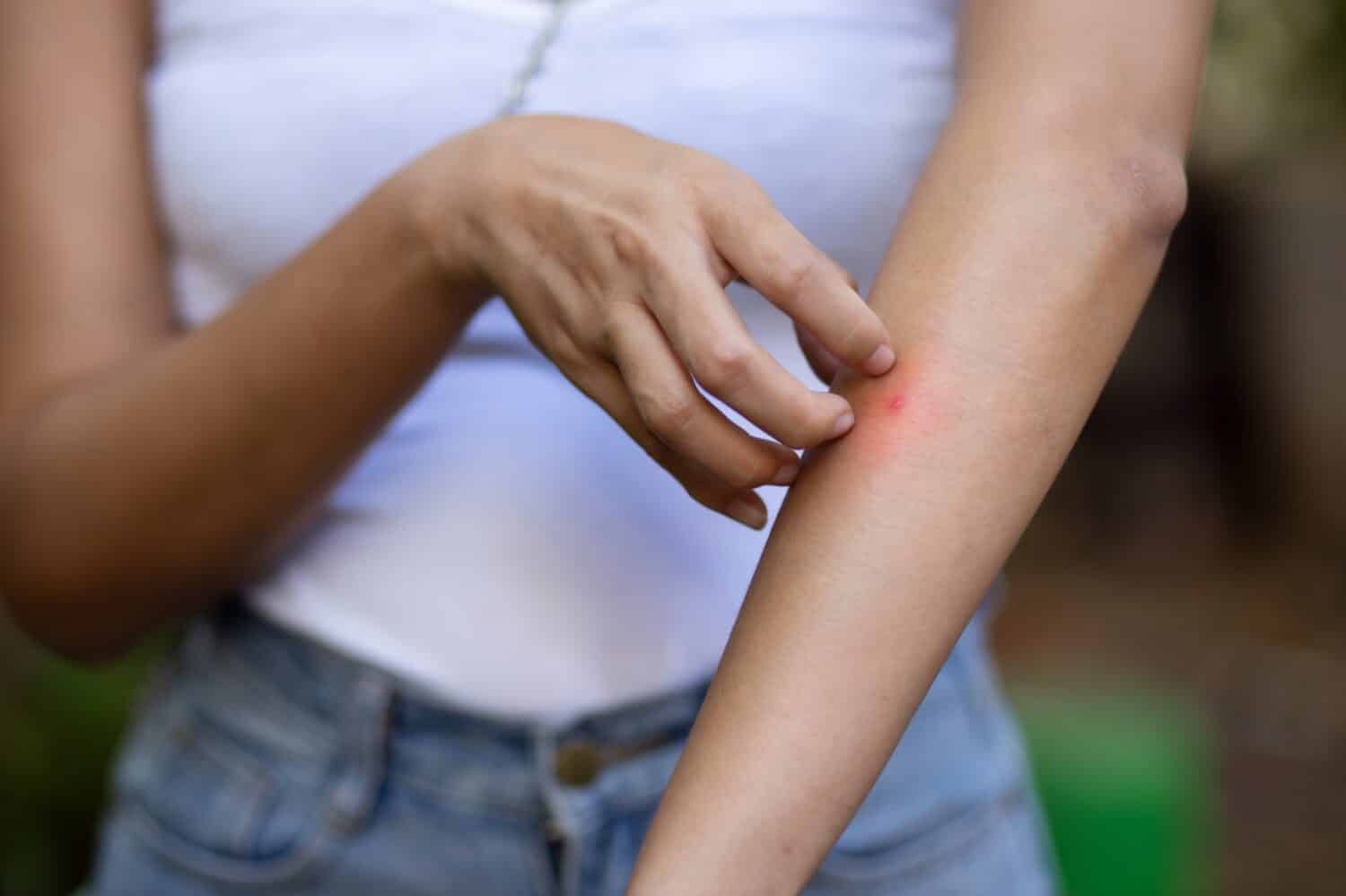
In sensitive individuals, mosquito bites can cause swollen red welts that itch.
©9nong/Shutterstock.com
When it comes to avoiding mosquito bites, there are certain types of clothing that you should steer clear of. Firstly, avoid wearing tight-fitting clothes as they tend to stick to the skin and provide less ventilation which can make your body heat up. Mosquitoes are attracted to warm bodies and will be more likely to bite you if you are overheating.
Another type of clothing that should be avoided is dark-colored clothing, especially black or navy blue. This is because mosquitoes are naturally drawn towards darker colors, so wearing lighter-colored clothes, such as white or pastel shades, can help minimize their attraction towards you.
Additionally, avoid wearing heavily scented perfumes or lotions, as this may attract mosquitoes towards you. Similarly, avoid using highly fragranced fabric softeners when washing your clothes, as this could also increase your attractiveness to these pesky insects.
Lastly, opt for long-sleeved shirts and pants instead of shorts and T-shirts whenever possible. While it may seem counterintuitive in hot weather conditions, covering up with loose-fitting clothing provides an extra layer between your skin and any biting insects trying to get through your clothes.
Overall, by being mindful of what types of clothing we wear during mosquito season (especially in areas where mosquitos carry diseases), we can significantly reduce our chances of getting bitten while enjoying outdoor activities!
The photo featured at the top of this post is © Carlo Emanuele Barbi/Shutterstock.com
Thank you for reading! Have some feedback for us? Contact the AZ Animals editorial team.




